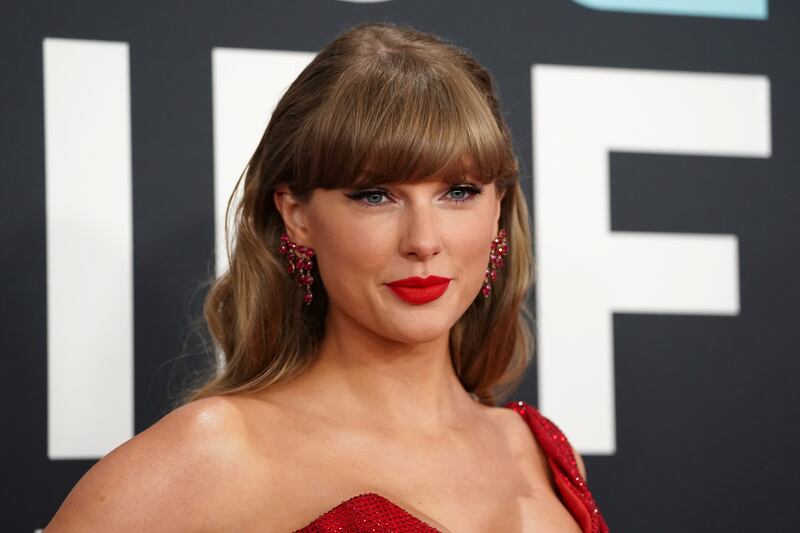Taylor Swift now owns all of her own music, after years of fighting to gain ownership of her entire catalog.
She shared a letter on her website explaining that she was able to purchase the rights to all of her music, music videos and concert films.
“To say this is my greatest dream come true is actually being pretty reserved about it,” she wrote. “To my fans, you know how important this has been to me — so much so that I meticulously re-recorded and released 4 of my albums, calling them Taylor’s Version."
What does this mean for ‘Reputation (Taylor’s Version)’?
Swift knew that fans would especially care about her sixth album and wonder what was happening with the “Taylor’s Version” of the album. So she addressed in the letter what will happen next with the two albums that she hasn’t released rerecorded versions of yet — “Reputation (Taylor’s Version)” and her debut album.
“Those 2 albums can still have their moments to re-emerge when the time is right, if that would be something you guys would be excited about. But if it happens, it won’t be from a place of sadness and longing for what I wish I could have. It will just be a celebration now.”
She also explained that she hasn’t finished rerecording “Reputation (Taylor’s Version)” and might not finish it. She did say she would likely still release the unreleased “Vault” tracks from that album.
“I know, I know. What about Rep TV? Full transparency. I haven’t even re-recorded a quarter of it,” Swift wrote. “The Reputation album was so specific to that time in my life and I kept hitting a stopping point when I tried to remake it.
“All that defiance, that longing to understood while feeling purposely misunderstood, that desperate hope, that shame-born snarl and mischief. To be perfectly honest, it’s the one album in those first 6 that I thought couldn’t be improved upon by redoing it. Not the music, or photos, or videos. So I kept putting it off. There will be a time (if you’re into the idea) for the unreleased Vault tracks from that album to hatch.”
Why didn’t Taylor Swift own her own music?
In 2019, Swift expressed frustrations about not being able to gain ownership of her entire music catalog after a dispute with Big Machine records.
She left Big Machine records in 2018 for a deal with Universal Music Group’s Republic Records. The next year, Big Machine and the label’s founder Scott Borchetta sold her masters to Ithaca Holdings.
In a Tumblr post, she shared her anger about the deal, saying that she has “pleaded for a chance” to buy her own work for years but was instead “given an opportunity to sign back up to Big Machine Records and ‘earn’ one album back at a time, one for every new one I turned in,” according to Time magazine.
The music artist rejected the offer, and also condemned the sale of her masters to Scooter Braun’s Ithaca Holdings.
In response to Swift’s Tumblr post, Borchetta wrote on Big Machine’s website, “Taylor had every chance in the world to own not just her master recordings, but every video, photograph, everything associated to her career. She chose to leave.”
In 2020, investment firm Shamrock Capital acquired the rights to Swift’s original six albums. She said in a social media post that she found out about the sale after receiving a letter from Shamrock Holdings “letting us know they had bought 100% of my music, videos, and album art from Scooter Braun. This was the second time my music had been sold without my knowledge.”
On Friday, she announced that she was able to purchase the entire library and rights from Shamrock Capital to now own all of her own music.
Why did Taylor Swift rerecord her music?
Shortly after announcing her frustrations about not being able to gain ownership of her music in 2019, Swift announced plans to rerecord her first six albums and release them for her fans.
Here are the albums that she rerecorded:
- “Fearless (Taylor’s Version),” April 9, 2021
- “Red (Taylor’s Version),” Nov. 12, 2021
- “Speak Now (Taylor’s Version),” July 7, 2023
- “1989 (Taylor’s Version),” Oct. 27, 2023
She expressed pride in being a part of the conversation in music ownership.
“I’m extremely heartened by the conversations this saga has reignited within my industry among artists and fans,” she wrote. “Every time a new artist tells me they negotiated to own their master recordings in their record contract because of this fight, I’m reminded of how important it was for all of this to happen.”


